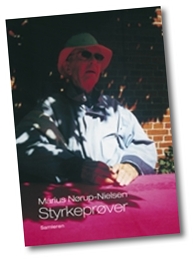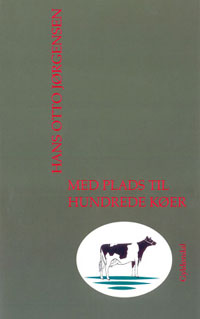Tonight I braved the streets of Nørrebro and went over to the Literature House for a reading by two Danish authors, the young Marius Nørup-Nielsen and the older Hans Otto Jørgensen. After the two authors read from their new works, a panel of three critics gave their opinions on the texts and took questions from the audience.
The three reviewers were — left to right — Lars Bukdahl, Erik Skyum-Nielsen and Leonora Christina Skov, the middle of whom is my professor for a class on the Theory of the Short Story.
 Marius Nørup-Nielsen’s volume Styrkeprøver is a genre-bending work that consists of many small, apparently disconnected stories. Throughout the work, questions of narrative self-aware arise — memorably dubbed “meta blah blah” by Skyum-Nielsen (using the characteristic Danish pronunciation of blah-blah as blay-blay.) The panel was divided on whether Nørup-Nielsen’s portrayal of young women’s consciousness was a breakthrough in first-person storytelling, or a thin stereotype, or a thin stereotype intended to portray male teenager’s idea of young women. No less divisive was his portrayal of young men, again centering on the question of whether the teenaged voices were authentic or not, and whether authenticity or lack thereof was intentional, intentionally ironic or something in between.
Marius Nørup-Nielsen’s volume Styrkeprøver is a genre-bending work that consists of many small, apparently disconnected stories. Throughout the work, questions of narrative self-aware arise — memorably dubbed “meta blah blah” by Skyum-Nielsen (using the characteristic Danish pronunciation of blah-blah as blay-blay.) The panel was divided on whether Nørup-Nielsen’s portrayal of young women’s consciousness was a breakthrough in first-person storytelling, or a thin stereotype, or a thin stereotype intended to portray male teenager’s idea of young women. No less divisive was his portrayal of young men, again centering on the question of whether the teenaged voices were authentic or not, and whether authenticity or lack thereof was intentional, intentionally ironic or something in between.
Skyum-Nielsen’s review of Stykreprøver for Information is here. An excerpt from the book, with my English translation following:
Helt stille i skolegården. Det var stadig mørkt, og jeg sad på en bænk under halvtaget. Pedellen kom for at låse op, det blev lyst, og jeg satte mig op i vindueskarmen i gangen på min klases etage. Når skoledagen var halvvejs forbi, i frokostpausen, fandt jeg igen min plads. De andre piger kom til, og vi sluttede en lille ring, åben mod byens virvar bag det store vinduesparti og lukket ind mod gangens barnlige støj og langsommelige pullslag fra dørenes gåen op og i. Vi talte i stedet for at spise, og da vores dimission nærmede sig, var der næsten plads ti, at vi alle kunne sidde i karmen. Vi var mange, og det gjaldt om at have haft færrest kærester. Jeg vandt, for de andre anede ikke, at jeg havde flest. Hverg gang en af pigerne annoncerede en ny hjertenskær, gik der ikke mange fester, før jeg også kunne lægge ham til i mit hemmelige regnskap.
«I vores familie lægger vi stor vægt på ritualer.»
Jeg røg alle mærker. Jeg drak det meste. Jeg var fyldt med oplevelse. Jeg blev hurtigt den ældste i den ældste klasse.
All quiet in the schoolyard. It was still dark, and I sat on a bench under the roof of the shed. The janitor came to unlock the building, it became light, and I sat up on the windowsill in the hallway on my class’s floor. When the schoolday was half over, during lunch break, I found my place again. The other girls arrived, and we formed a small ring, open to the city’s bustle behind the large window and closed in against the hallway’s childish noise and slow pulse from the doors’ opening and closing. We talked instead of eating, and as our graduation approached, there was almost enough room for us all to sit on the windowsill. There were a lot of us, and it was all about having the fewest boyfriends. I won, because the others didn’t suspect I had the most. Each time one of the girls announced a new beloved, it didn’t take very many parties before I could also put him into my secret ledger.
“In our family we put a great emphasis on rituals.”
I smoked all the brand names. I drank the most. I was full of experiences. I soon became the oldest in the oldest class.
 Hans Otto Jørgensen read from his new work Med plads til hundre køer, which is actually the last part of a trilogy. Skyum-Nielsen’s review of the work is here.
Hans Otto Jørgensen read from his new work Med plads til hundre køer, which is actually the last part of a trilogy. Skyum-Nielsen’s review of the work is here.
Words on the page can’t describe how Jørgensen reads his work; it’s like reciting poetry, with no breaks for paragraphs or hardly even sentences. Goes to show you don’t have to write like a Beat Poet to sound like one when you read aloud. My English translation follows this excerpt:
Det var den støj, han havde forsøgt at ryste ud af Ejnars lyserøde transistorradio, når han om aftenen sad helt inde i den i køkkenet og drejede på knapperne.
Ida mente, det var for at genere hende, og det var det nok også til dels. Han fik en på hovedet og grinede og drejede på knapperne og fik en til og grinede endnu mere, men her, nu, langt om længe, mens Lin sover branderten ud, trænger Lou Reed og hans Loaded igennem og får den sat på en slags formel.
At der er den støj, så rasende og skinger, men at den også har udstrækning. At der er et forløb i det, herfra og dertil.
I found a reason to keep living
And the reason is you
I found a reason to keep singing
And the reason is you
Det er et gennembrud for ham. Det er ikke så meget at snakke om. Som at stavre ud af beværtningen og fide, at der for faen stadig er penge på kontoen.
Det er ikke slut.
Det er til at leve med.
Alt i alt.
At det skulle genre være et lommetørklæde,
Hvis jeg måtte se på et lommetørklæde, et slips. Til en gave.
Vanskligere er det ikke. Det er rimeligt.
Det er muligt, og det er rimeligt. At der er en disk, et kasseapparat. Det er nogle varer, og man kan sige, at den gerne skulle være noget pænt.
At det skal pakkes ind. Det er en gave. Sådan er det tænkt.
Det er ikke til mig selv.
Det er det, han står overfor. Det er den vansklighed. Om det er godt nok. Om det er til at leve med. Om han kan vise sig noget sted igen.
Det er det, Lou Reed gør ved ham. At der på den måde kommer et forløb ud af det. Af alt det der er ham, af alt det han har spildt. At han er så grundigt forladt.
Det sker ikke på en gang. Det er svært at forklare, men ord som lejlighedsvis, af-og-til og senere dækker måske. Det har noget med tid at gøre.
Ikke afstand, men tid. Ikke fylde, men det modsatte af fylde. Noget med at ga sidelæns. Så får vi det derhen, hvor det hører hjemme. I hvert fald er det flytbart, mere end det flytter sig.
Det er en sult, der stilles.
Det er den nål i armen.
Modet til at omgås det banale. At skide i en ble. At være så vred, ude af sig self. At føle sig så ydmyget, så meget alene med det. Det er det, det handler om.
It was that noise he had tried to shake out of Ejnar’s pink radio, when he sat one evening in the kitchen nearly inside it, turning the knobs.
Ida thought it was it was to annoy her, and it probably was to an extent. He got one on the head and laughed and turned the knobs and got another one and laughed even more, but here, now, at long last, while Lin was sleeping it off, Lou Reed and his Loaded comes out and puts it into kind of a formula:
I found a reason to keep living
And the reason is you
I found a reason to keep singing
And the reason is you
It’s a breakthrough for him. Not much to talk about. Like staring out the window of a pub and knowing that goddamnit, there’s still money in the bank.
It’s not gone.
There’s enough to live with.
All in all.
That it really should be a handkerchief.
If I could just get a handkerchief, a tie. As a present.
It’s no harder than that. It’s reasonable.
It’s possible and reasonable. That there’s a counter, a cash register. Some things for sale — that would be something nice.
That it gets packed in. It’s a gift. Think about it like that.
It’s not for myself.
That’s what he’s facing. That’s the difficulty. If it’s good enough. If it’s enough to live with. If he can show himself anywhere again.
That’s what Lou Reed does to him. That it comes out like a sequence, just like that. From everything that’s him, from everything he’s wasted. That he is so profoundly derelict.
It doesn’t happen all at once. It’s hard to explain, but words like occasional, from time to time, and later will do, maybe. It has something to do with time.
Not distance, but time. Not presence, but the opposite of presence. Something to do with going sideways. So we get to where we belong. It’s movable, anyway, more than it moves.
It’s a hunger that’s quieted.
It’s that needle in your arm.
The fashion of associating with the banal. Like crapping in a diaper. To be so angry, beside yourself. To feel so humiliated, so entirely alone with it. That’s what it’s about.]
Den Blå Port, one of the premiere literary journals, helped put on the event. Tue Andersen Nexø, one of the editors of the magazine, was present and asked quite a few questions — coincidentally, he’s also teaching a class on Welfare State literature I’m taking.